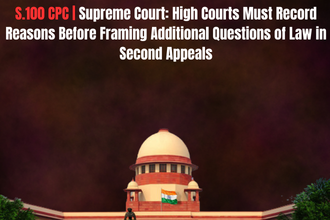The Supreme Court of India has once again turned its attention to one of the most pressing issues affecting the criminal justice system—prolonged delays in the framing of charges, a foundational stage in criminal trials. Despite the clear statutory mandate under Section 251(b) of the Bharatiya Nagarik Suraksha Sanhita (BNSS) that charges in cases exclusively triable by a Sessions Court must be framed within 60 days of the first hearing, courts across the country are routinely failing to meet this deadline.
In a significant development, a Bench comprising Justice Aravind Kumar and Justice NV Anjaria has expressed willingness to issue uniform, nationwide directions to tackle the systemic issue. The Bench observed that non-compliance with statutory timelines has led to substantial stagnation in trials, leaving many accused individuals languishing in custody without progress in their cases.
Background of the Case
The Bench was hearing a plea in Aman Kumar v. State of Bihar (SLP (Crl) No. 8437/2025), where the petitioner has been in custody since August 2024. Despite a chargesheet having been filed and all co-accused also being in judicial custody, charges had not been framed for nearly a year.
The petitioner sought bail, arguing:
- He has been falsely implicated.
- The delay in framing charges has resulted in a violation of his right to a fair and speedy trial under Article 21 of the Constitution.
Supreme Court’s Strong Observations
Justice Aravind Kumar sharply questioned the persistent and unjustified delays, stating:
“Why does it take years and years to frame charges? In civil matters, issues are not framed in time; in criminal cases, charges are not framed in time. Unless charges are framed, trial cannot even begin. This problem is widespread. We propose to issue directions across the country.”
The Court noted that despite the introduction of BNSS with the aim of improving procedural efficiency, courts are routinely violating the 60-day mandate, and the situation “appears to be prevalent in most states.”
Concerns Raised by States
- Bihar’s Counsel supported the need for guidelines, acknowledging delays between chargesheet filing and charge framing.
- Maharashtra’s Counsel referred to a recent order by Justice Sanjay Karol noting a “shocking state of affairs”—with 649 cases in Maharashtra alone awaiting charge framing.
However, Justice Kumar asserted that the Court will not wait for district-level reports and will move ahead with pan-India directions.
Assistance Sought from Legal Experts
To ensure comprehensive solutions, the Court has requested assistance from:
- Senior Advocate Siddharth Luthra (as Amicus Curiae)
- Attorney General for India
- Solicitor General Tushar Mehta
- Senior Advocate S. Nagamuthu
The matter will be relisted in two weeks, signalling swift judicial intent.
Why Framing of Charges Is Crucial
Framing of charges is a pivotal stage in criminal trials, as it:
- Officially informs the accused of the allegations.
- Marks the beginning of the trial.
- Allows evidence and witness examination to commence.
When charges are delayed:
- The trial cannot start, leading to prolonged incarceration, especially for undertrials.
- It results in case backlogs, further burdening courts.
- It violates the constitutional right to speedy trial.
In India, where nearly 75% of inmates are undertrials (NCRB Data), such delays are deeply consequential.
Section 251(b) BNSS — The Legal Mandate
Section 251 BNSS (2023) replaced Section 228 CrPC.
Clause (b) specifically states:
Charges in cases triable exclusively by the Sessions Court must be framed within 60 days from the first hearing after the filing of the chargesheet.
However, without strict accountability, this procedural reform remains only on paper.
Expected Pan-India Directions Could Include:
- Mandatory timelines for framing of charges.
- Periodic judicial monitoring at the district level.
- Performance reports from trial courts.
- Consequences for unjustified delay, such as administrative action.
- Automatic consideration of bail where delay exceeds statutory limits.
If implemented, these measures may significantly reduce pendency and uphold fairness.
Connection to Larger Judicial Concerns
This development aligns with earlier Supreme Court observations:
- On delayed bail hearings.
- On undertrial overcrowding in prisons.
- On the need for judicial time-bound case management.
The Court’s stance signals a shift toward systemic reform, not mere case-specific relief.
Conclusion
The Supreme Court’s decision to consider nationwide guidelines for timely framing of charges marks an important moment in India’s criminal justice reform movement. If effectively implemented, this could:
- Ensure faster trials
- Reduce undertrial detention
- Strengthen the right to life and personal liberty
- Increase public trust in the judiciary
As the Bench prepares for the next hearing, all eyes now turn to the upcoming pan-India directions—which may shape the future of criminal trial procedure under BNSS.
Also Read


